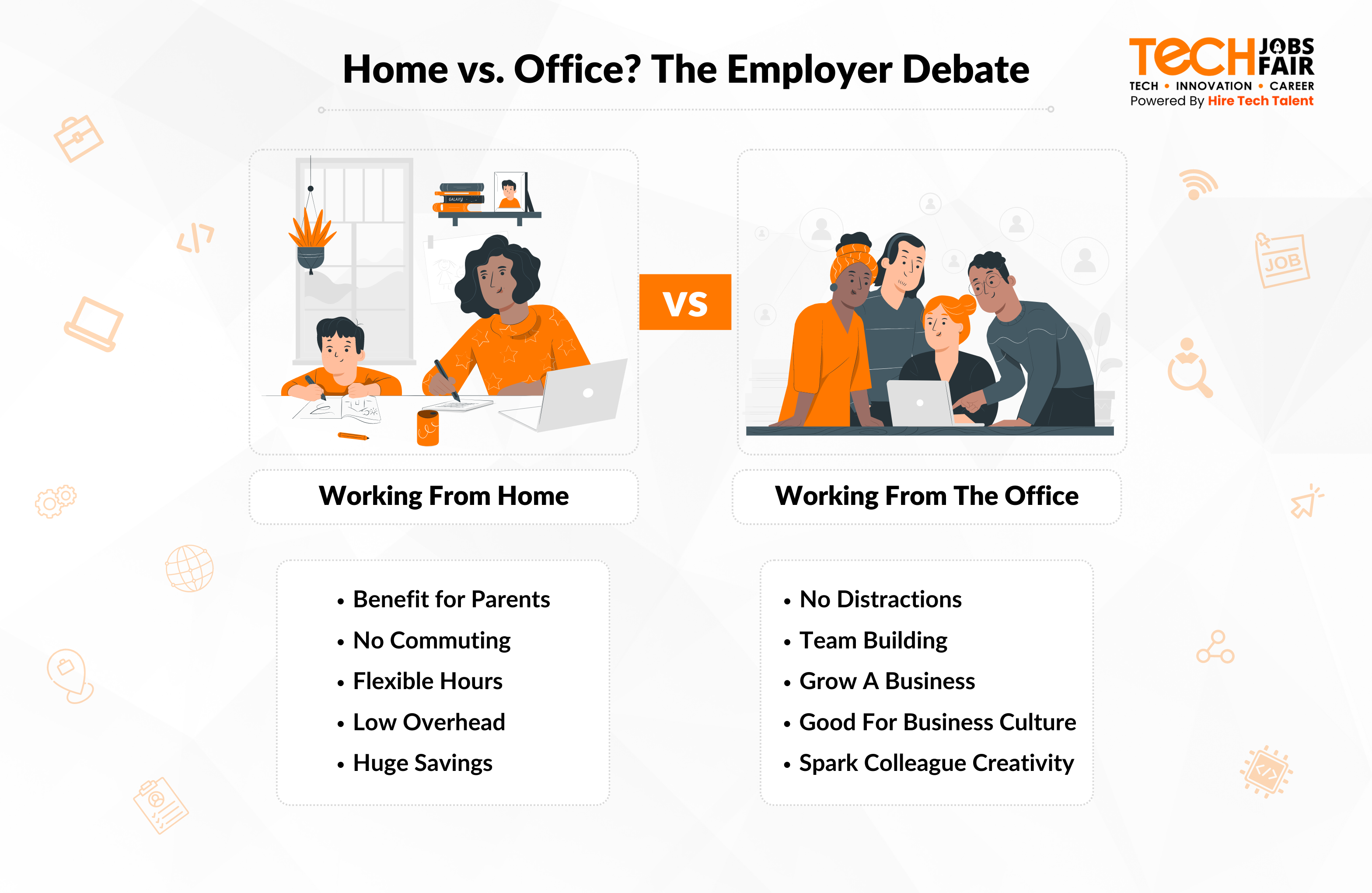- « Previous blog
-
April 1, 2022
-
4305
- Next blog »
The controversy over Work From Home vs Work From Office has acquired significant traction in the aftermath of extraordinary changes in work dynamics. The typical 9-to-5 office layout has been questioned as remote work has emerged as a viable option. Employees worldwide are at a crossroads in determining which arrangement best fits them as organizations strive to balance freedom and productivity. In this blog, we will look at the benefits and downsides of both paradigms to answer the age-old question, “Work From Home Vs Work From Office – Which Is Better?”
1. Office Environment versus Home Environment
Do you work from a desk area? An open office plan?
While working at the office, you don’t have a decision in your work environment or office setting. You could have a loud coworker or sit under the air conditioner, affecting productivity.
Working from home empowers everybody to set up their ideal home office or workstation.
You can pick a standing work area over a sitting one and select your decision of office furniture. Working from home empowers you to comprehend your ideal work environment, anything that it could be.
2. Monetary Costs While Work From Home Vs Work From Office
The Work From Home Vs Work From Office can be seen regarding finances.
While working at an office, you pay for transport expenses, like public travel, gas, or maintenance. If you travel by vehicle, you will need to pay for parking. You will get an espresso or purchase lunch during the day. These costs add up.
When you work from home, there are tons of monetary advantages. You don’t need to stress over sitting in rush hour gridlock or driving costs, and you will not be enticed to go out after work and spend money on other activities such as eating out.
Working from home has its expenses. Such as internet costs, employees need to contemplate their electricity bill. Classic work at home jobs has their expenses like desks, chairs, internet routers, and desktops. Remote working vs office has its pros and cons regarding monetary costs.
3. No Commute
One of the significant upsides of working from home is the end of the drive. Overall, individuals in India spend not less than 2 hours every day going to and from work. Not just sitting around can be spent beneficially, but it also hampers work-life balance, which also affects our work ethics extraordinarily. Assuming that an individual works a standard all day (or 6) and is going through 7% of their day in rush hour gridlock, it’s normal for them to feel as if they don’t have a day-to-day existence outside of work.
In any case, when your work should be possible from the solace of your love seat, it doesn’t appear as awkward as in the past.
4. Teamwork and Organizational Growth
By its actual nature, working from home prevents teamwork. To make things more straightforward for employees, work plans are typically divided by their sets of expectations and as long as their day-to-day quantities are met, things can stream without a hitch. Notwithstanding, a solitary hindrance can set the whole group off course.
Coordinating with multiple people over the phone or through video calls, while conceivable, is a wasteful approach to handling issues since it doesn’t permit eye-to-eye connections. It requires some investment to get thoughts across for endorsement over a Zoom call where ten others are viewing for screen time. Along these lines, Working from Home can hinder teamwork and lead to disarray.
5. Productivity Trap
Popular surveys will let you know that a greater part of individuals feels significantly more helpful while working from home. In any case, this feeling is converted into activities when you have a set schedule which is fundamental for keeping a constant flow of results. While the home’s features are consoling, that perspective can be counter-useful.
Tarrying can bloom unbridled at home, or more regrettably, you could overexert yourself. Working without help from anyone else can likewise handicap your imagination. In this manner, working from home doesn’t constantly ensure results. Work From Home Vs Work From Office, the productivity of an individual varies.
A Transformative Impact of COVID on Jobs
The COVID-19 pandemic’s arrival resulted in a fundamental change in how we see the world. Aside from its health implications, the pandemic caused significant changes in many parts of our life, most notably in the field of work. Examining the employment environment before and after COVID reveals a dramatic influence on sectors, labour relationships, and the fundamental essence of work itself.
The Traditional Work Paradigm Before COVID
Before the pandemic, the typical work environment included crowded offices, regular commutes, and face-to-face encounters. The usual 9-to-5 schedule remained, with few opportunities for remote employment. Hospitality, retail, and entertainment industries relied on physical presence, whereas technology and certain professional services accepted restricted remote work opportunities.
The Rise of Remote Work and Digital Transformation Following COVID
The pandemic accelerated the trend toward remote employment and digital change. Lockdowns and safety concerns compelled firms to change or risk becoming obsolete. Remote work became the norm, made possible by technological advances that permitted seamless communication and cooperation. This transition fueled advancements in remote work tools, cybersecurity, and cloud infrastructure. In the aftermath, there was increased demand for remote software engineers, cybersecurity professionals, and internet content makers.
Before COVID: Job Roles and Employment Stability
Before the pandemic, specific employment roles were stable, seemingly immune to economic swings. Traditional industries such as healthcare, banking, and government-provided stable employment. In-person connections and physical labor supported businesses such as hospitality and manufacturing.
Disruption and New Opportunities After COVID
The pandemic demolished the concept of work security and Work From Home Vs Work From Office in unanticipated ways. Entire sectors were subjected to unprecedented upheaval. As e-commerce grew, brick-and-mortar retail faltered. In the middle of this turmoil, fresh possibilities arose. The growth of digital health has increased the demand for telehealth specialists and health tech innovators. Demand for online educators and instructional designers has surged due to e-learning platforms. Gig economy occupations became popular as delivery services and app-based businesses became commonplace.
Work From Home Vs Work From Office: Where Does the Future Lie
The Work From Home Vs Work From Office banter confounds even the individuals who benefit from one or the other way of thinking because the benefits of the other are too worthwhile even to consider ignoring. Nonetheless, the response could lie in finding harmony between the two. Isolating the working week into days where employees work from home and days where they need to answer to the office can not just keep up with the up-sides of a work-from-home environment, it can wipe out the smothering of inventiveness and stream of work in an association.
On days employees visit the office, conceptualizing and meetings can run in half, and these thoughts can be converted into the completed result at home. This offers the two employers and employees the chance to have a helpful work-life balance and provides the ideal system of work optimized for the future.
Conclusion
One irrefutable reality arises from the ever-changing dynamics of remote work and office presence: the option between Work From Home Vs Work From Office extends well beyond basic logistics. We’ve discussed the benefits of flexibility and autonomy in WFH, as well as the collaborative synergy of WFO, and it’s evident that the decision reflects our particular objectives, roles, and circumstances.
It’s important to embrace the potential of both worlds to create work lives tailored to our requirements and objectives. The revolutionary period we are living in provides us with instruments that go beyond physical bounds. Remote collaboration tools, digital platforms, and virtual networking possibilities are entry points to new productivity levels, creativity, and personal development.
The key point is to recognize that work is no longer limited to a specific place or technique. It’s about using these technologies to create a professional life that works with our personal lives. Finding the right blend of focused autonomy and enriching cooperation, structure, and flexibility becomes our road map to success in this dynamic landscape.
Let us keep the lessons acquired from this historic age with us as we move forward. Let us encourage adaptation and open-mindedness, viewing the ever-changing workplace as a chance to fine-tune our methods, rethink our priorities, and strengthen our well-being. Finally, the ability to design our work life is in our hands – a power that we wield with intelligence, resilience, and an unshakable dedication to shaping a future about more than simply work.
Join 20,000+ Subscribers
Get exclusive access to new tips, articles, guides, updates, and more.



